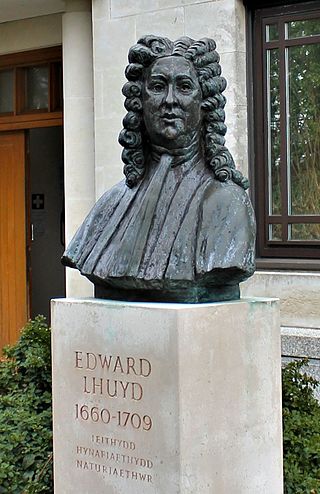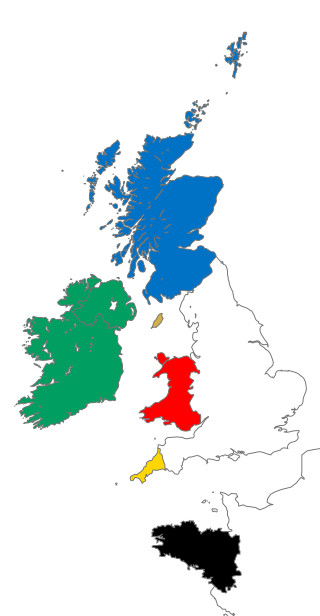Taliesin was an early Brittonic poet of Sub-Roman Britain whose work has possibly survived in a Middle Welsh manuscript, the Book of Taliesin. Taliesin was a renowned bard who is believed to have sung at the courts of at least three kings.

The Mabinogion are the earliest Welsh prose stories, and belong to the Matter of Britain. The stories were compiled in Middle Welsh in the 12th–13th centuries from earlier oral traditions. There are two main source manuscripts, created c. 1350–1410, as well as a few earlier fragments. The title covers a collection of eleven prose stories of widely different types, offering drama, philosophy, romance, tragedy, fantasy and humour, and created by various narrators over time. There is a classic hero quest, "Culhwch and Olwen"; a historic legend in "Lludd and Llefelys," complete with glimpses of a far off age; and other tales portray a very different King Arthur from the later popular versions. The highly sophisticated complexity of the Four Branches of the Mabinogi defies categorisation. The stories are so diverse that it has been argued that they are not even a true collection.

The Annales Cambriae is the title given to a complex of Latin chronicles compiled or derived from diverse sources at St David's in Dyfed, Wales. The earliest is a 12th-century presumed copy of a mid-10th-century original; later editions were compiled in the 13th century. Despite the name, the Annales Cambriae record not only events in Wales, but also events in Ireland, Cornwall, England, Scotland and sometimes further afield, though the focus of the events recorded especially in the later two-thirds of the text is Wales.

Edward Lhuyd was a Welsh naturalist, botanist, linguist, geographer and antiquary. He is also named in a Latinate form as Eduardus Luidius.
Nicholas Jonathan Anselm Williams, sometimes credited as N. J. A. Williams, is a leading expert and poet in the Cornish language.

The National Library of Wales, Aberystwyth, is the national legal deposit library of Wales and is one of the Welsh Government sponsored bodies. It is the biggest library in Wales, holding over 6.5 million books and periodicals, and the largest collections of archives, portraits, maps and photographic images in Wales. The Library is also home to the national collection of Welsh manuscripts, the National Screen and Sound Archive of Wales, and the most comprehensive collection of paintings and topographical prints in Wales. As the primary research library and archive in Wales and one of the largest research libraries in the United Kingdom, the National Library is a member of Research Libraries UK (RLUK) and the Consortium of European Research Libraries (CERL).
Prof Kenneth Hurlstone Jackson CBE FRSE FSA DLitt was an English linguist and a translator who specialised in the Celtic languages. He demonstrated how the text of the Ulster Cycle of tales, written circa AD 1100, preserves an oral tradition originating some six centuries earlier and reflects Celtic Irish society of the third and fourth century AD. His Celtic Miscellany is a popular standard.

Celtic studies or Celtology is the academic discipline occupied with the study of any sort of cultural output relating to the Celtic-speaking peoples. This ranges from linguistics, literature and art history, archaeology and history, the focus lying on the study of the various Celtic languages, living and extinct. The primary areas of focus are the six Celtic languages currently in use: Irish, Scottish Gaelic, Manx, Welsh, Cornish, and Breton.

The Celtic nations are a cultural area and collection of geographical regions in Northwestern Europe where the Celtic languages and cultural traits have survived. The term nation is used in its original sense to mean a people who share a common identity and culture and are identified with a traditional territory.

Eric Pratt Hamp was an American linguist widely respected as a leading authority on Indo-European linguistics, with particular interests in Celtic languages and Albanian. Unlike many Indo-Europeanists, who work entirely on the basis of written materials, he conducted extensive fieldwork on lesser-known Indo-European languages and dialects, such as Albanian, Arbëresh and Arvanitika; Breton; Welsh; Irish; Resian and Scots Gaelic.

"Pangur Bán" is an Old Irish poem, written in about the 9th century at or near Reichenau Abbey, in what is now Germany, by an Irish monk about his cat. Pangur Bán, 'White Pangur', is the cat's name, Pangur possibly meaning 'a fuller'. Although the poem is anonymous, it bears similarities to the poetry of Sedulius Scottus, prompting speculation that he is the author. In eight verses of four lines each, the author compares the cat's happy hunting with his own scholarly pursuits.
John Robert Morris was an English historian who specialised in the study of the institutions of the Roman Empire and the history of Sub-Roman Britain. He is best known for his book The Age of Arthur (1973), which attempted to reconstruct the history of Britain and Ireland during the so-called "Dark Ages" following the Roman withdrawal, based on scattered archaeological and historical records. Much of his other work focused on Britain during this time.

The Roman era in the area of modern Wales began in 48 AD, with a military invasion by the imperial governor of Roman Britain. The conquest was completed by 78 AD, and Roman rule endured until the region was abandoned in 383 AD.

Brut y Brenhinedd is a collection of variant Middle Welsh versions of Geoffrey of Monmouth's Latin Historia Regum Britanniae. About 60 versions survive, with the earliest dating to the mid-13th century. Adaptations of Geoffrey's Historia were extremely popular throughout Western Europe during the Middle Ages, but the Brut proved especially influential in medieval Wales, where it was largely regarded as an accurate account of the early history of the Celtic Britons.
John Carey is an American philologist, professor, and scholar of Celtic studies, specialising in subjects of early Irish and Welsh literature, religion, and mythology. A graduate of Harvard University, he was an associate professor at the Department of Celtic Languages and Literature. He has received fellowships at Warburg Institute, the Institute of Irish Studies at Queen's University, Belfast and the Dublin Institute for Advanced Studies. He later moved to the Department of Early and Medieval Irish at the University College Cork (UCC), where he now teaches. He is fellow at the Temenos Academy and editor of Temenos Academy Review.
Gearóid Mac Eoin is an Irish academic whose studies have focused especially on aspects of Irish language, literature and history.
Common Brittonic, also known as British, Common Brythonic, or Proto-Brittonic, was a Celtic language spoken in Britain and Brittany.
Jenkyn Beverley Smith, FLSW, FRHistS, published as J. Beverley Smith, is a historian of medieval Wales, who was successively Sir John Williams Professor of Welsh History (1986–95), Research Professor of Welsh History (1995–99) and Emeritus Professor at Aberystwyth University.
Neo-Brittonic, also known as Neo-Brythonic, is a stage of the Insular Celtic Brittonic languages that emerged by the middle of the sixth century CE. Neo-Brittonic languages include Old, Middle and Modern Welsh, Cornish, and Breton, as well as Cumbric.









